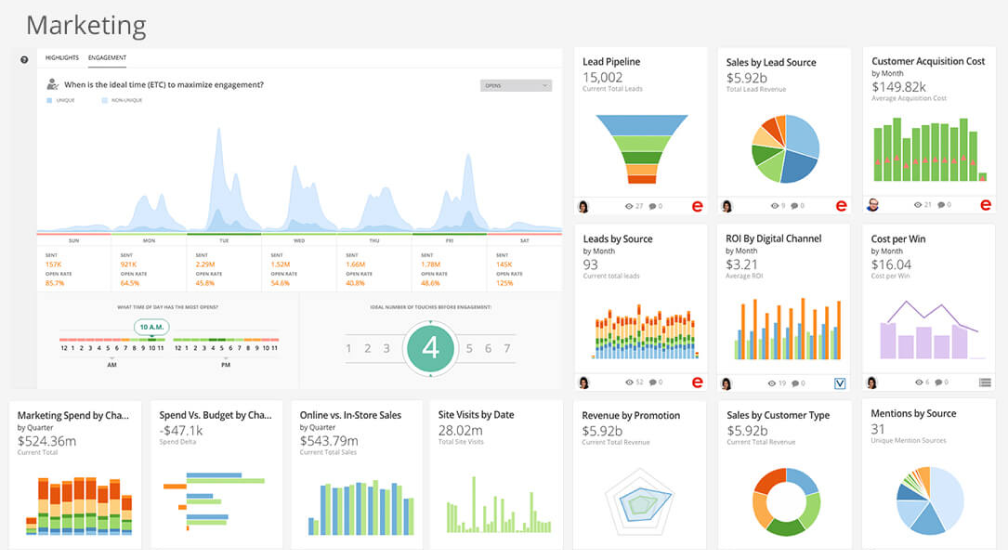How business intelligence is revolutionizing the way we make decisions
Business intelligence has been around for a while, but it hasn’t become mainstream in business until fairly recently. There’s a good reason for that.
As data has become the new currency, those who can make sense of it have a distinct advantage over those who can’t.
This is especially true in business, where the ability to make informed decisions based on reliable data can mean the difference between success and failure.
Business intelligence has traditionally been used by large organizations with deep pockets and access to vast amounts of data. But thanks to the rise of big data and advances in technology, BI is now within the reach of small- and medium-sized businesses.
There are a number of different business intelligence tools available, but they all share a common goal: to help you make better decisions. Whether you run a small business or a large corporation, BI can give you the insights you need to achieve success.
Let’s dive in by looking at what business intelligence is and what it can do for your business.
What is business intelligence?
Business intelligence (BI) is a term that is used for a variety of different tools and techniques used to collect, store, analyze, and visualize data. The goal of BI is to help business leaders make better decisions by providing them with insights into their business operations.
You may be surprised to learn that BI is not new. In fact, it has been around for decades. However, it has only recently become popular due to advances in technology and the explosion of data.
With new advances in BI tools and techniques, businesses of all sizes can now take advantage of BI to improve their decision-making. No matter the size of your organization, you can use BI to your advantage.
How has BI evolved over the years?
BI has come a long way since it was first introduced. In the early days of BI, the focus was on gathering static data and generating reports. While these tools are still in use today, they are no longer the primary focus of BI.
These early tools were useful for getting a high-level overview of what was going on in a business, but they didn’t provide much in the way of actionable insights.
Over time, BI has evolved to become more focused on analytics. This means that instead of just collecting data, BI tools now help you analyze that data to uncover trends and patterns. This information can then be used to make better decisions about your business.
The latest generation of BI tools takes this one step further by incorporating artificial intelligence (AI) and machine learning.
This means that BI tools can now not only help you collect and analyze data, but they can also provide predictions about what might happen in the future. This is extremely powerful information that can help you make decisions about your business that are based on data, not guesswork.

What are the benefits of using BI for small businesses?
Small businesses have usually been at a disadvantage when it comes to data-driven decisions. This is because they typically haven’t had access to the robust data analytics tools that larger enterprises are able to purchase and use. But thanks to advances in BI, that is no longer the case.
Small businesses can now take advantage of the same BI tools that larger businesses are using. This level playing field gives small businesses the ability to make better decisions and compete with larger businesses on a more equal footing.
There are a number of benefits that small businesses can reap from using BI, including
1. Improved decision-making
With BI, small businesses can now make decisions that are based on data. This means that they can avoid making costly mistakes and instead confidently make decisions that will help their business grow.
For example, companies that use BI can make data-driven decisions about where to allocate their resources. This can help them focus on areas that are most likely to generate a return on investment, instead of blindly throwing money at different projects.
2. Increased efficiency
BI tools can help small businesses automate tasks that were previously done manually. This frees up time and resources that can be better used elsewhere.
BI tools can be used to automate the process of generating reports. This means that instead of manually creating reports, businesses can now use BI tools to do it for them. This can save a significant amount of time and money in the long run.
3. Greater insights
Small businesses can use BI to gain insights into their customers, their business processes, and the market. This information can be used to make better decisions about how to run their business.
For example, businesses can use BI to track customer behavior. This information can then be used to improve the customer experience and increase sales.
4. Competitive advantage
With BI, small businesses can better compete with larger businesses. This is because they have the ability to find the caliber of insights that larger businesses have.
5. Improved financial performance
In the end, all businesses want to improve their bottom line. BI can help them do just that.
Studies have shown that businesses that use BI tools tend to outperform those that don’t. This is because BI provides the insights that businesses need to make informed decisions about where to allocate their resources. This can lead to improved financial performance and higher profits.

The different types of BI tools available and how to pick the right one for you
If you are ready to take advantage of the benefits of BI, the next step is to choose the right BI tool for your business. There are a number of different types of BI tools available, each with their own strengths and weaknesses.
To help you choose the right BI tool for your business, understanding the various features of the different types of BI tools is essential. Here are some of the most popular types of BI tools:
1. Data visualization tools
These tools help you visualize data in a way that is easy to understand. They can be used to create charts, graphs, and other visualizations that make it easier to see trends and patterns.
These tools enable you to see your data in a new light and can help you uncover hidden insights.
2. Data mining tools
These tools enable you to mine data for insights. They work by analyzing large data sets to find patterns and relationships.
Data mining tools can be used to predict future trends and behaviors. This information can then be used to make better decisions about your business.
3. Dashboard tools
These tools help you track key metrics and performance indicators and display them in an easy-to-understand format. They allow you to see how your business is performing at a glance.
Dashboards can be customized to show the information that is most important to you. This makes it easy to spot problems and opportunities so that you can take action.
4. Reporting tools
These tools generate reports based on data from your business. They can be used to track progress, identify trends, and make decisions about your operations.
Reporting tools can be used to generate both real-time and historical reports. This information can then be used to improve your business.
5. Scorecard tools
These tools help you track and measure key performance indicators (KPIs). They allow you to see how well your business is performing compared to its goals.
The right BI tool for your business will depend on your specific needs. To choose the right BI tool for your business, determine your needs and identify which BI tool features will best meet those needs.
Consider what you ultimately want to do with your data and choose the BI tool that is best suited for that task.
The bottom line
Business intelligence is revolutionizing the way we make decisions. With the right BI tool, you can gain insights into your business that will help you make better decisions and improve your bottom line.
Don’t wait for your competitors to get ahead. Use BI to make better decisions and improve your business today.
